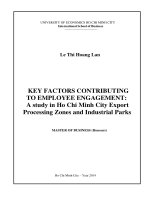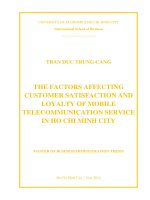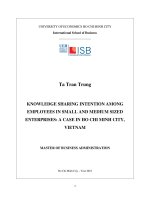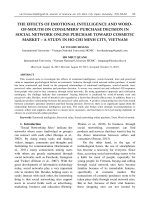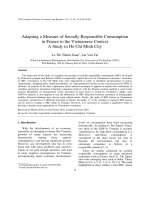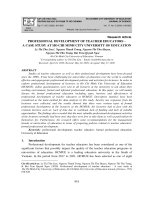Immigration officers’ english listening difficulties and use of strategies a study at ho chi minh city immigration office
Bạn đang xem bản rút gọn của tài liệu. Xem và tải ngay bản đầy đủ của tài liệu tại đây (2.3 MB, 111 trang )
MINISTRY OF EDUCATION AND TRAINING
HO CHI MINH CITY UNIVERSITY OF TECHNOLOGY
-----------------------------
NGUYEN QUANG MINH
IMMIGRATION OFFICERS’ ENGLISH
LISTENING DIFFICULTIES AND USE OF
STRATEGIES: A STUDY AT HO CHI MINH
CITY IMMIGRATION OFFICE
Major: English Language
Course code: 60220201
HO CHI MINH CITY, SEPTEMBER 2021
i
MINISTRY OF EDUCATION AND TRAINING
HO CHI MINH CITY UNIVERSITY OF TECHNOLOGY
---------------
IMMIGRATION OFFICERS’ ENGLISH
LISTENING DIFFICULTIES AND USE OF
STRATEGIES: A STUDY AT HO CHI MINH
CITY IMMIGRATION OFFICE
Total words: 18,706
Submitted to the
Faculty of English Language
in partial fulfillment of the Master’s degree in English Language
Class: 19SNA11
By
NGUYEN QUANG MINH
Supervised by
LE VAN TUYEN, Ph.D.
HO CHI MINH CITY, SEPTEMBER 2021
i
The thesis entitled IMMIGRATION OFFICERS’ ENGLISH LISTENING
DIFFICULTIES AND USE OF STRATEGIES: A STUDY AT HO CHI MINH
CITY IMMIGRATION OFFICE was successfully defended and approved on
……….…. at Ho Chi Minh City University of Technology (HUTECH).
Academic supervisor: Dr. LE VAN TUYEN
Examination Committee
1. Nguyen Thi Kieu Thu, Ph.D.
Chair
2. Tran Quoc Thao, Ph.D.
Reader 1
3. Luu Thi Mai Vy, Ph.D.
Reader 2
4. Nguyen Ngoc Tran Chau, Ph.D.
Member
5. Duong My Tham, Ph.D.
Secretary Member
On behalf of the Examination Committee
Chair
Nguyen Thi Kieu Thu, Ph.D.
ii
HCMC UNIVERSITY OF TECHNOLOGY
POSTGRADUATE INSTITUTE
HCMC, September 2021
MASTER’S THESIS REPORT
Student name: Nguyen Quang Minh
Sex: Male
Date of birth: 30/01/1984
Place of birth: Ho Chi Minh City
Major: English Language
Student code: 1941900017
I- Thesis title:
Immigration Officers’ English Listening Difficulties and Use of Strategies: A
Study at Ho Chi Minh City Immigration Office
II-Objectives and contents:
This study aims at exploring difficulties in English listening skills and use of
strategies of immigration officers at HIO. The specific objectives of this study are
as follows:
§ to find out difficulties in English listening skills;
§ to examine which strategies used by immigration officer to overcome
difficulties in English listening skills.
This study was conducted at Ho Chi Minh City Immigration Office. The study
focused on English listening difficulties and strategies of immigration officers. The
participants were the officers who were also from different backgrounds. The ages
of the participants ranges from 19 to 30 over with an average of 25. The findings
found out common listening difficulties that immigration officers had in listening
iii
skills such as the difficulties related to the content of dialogue, the content of
linguistic factors, the listener, the speaker and the physical setting. Moreover, the
findings showed that immigration officer frequently used the cognitive,
metacognitive and socio-affective listening strategies to deal with listening
difficulties. In order to gain the results, the quantitative and qualitative methods
were applied. In addition, two instruments used for data-collection were
questionnaire and semi-structured interview.
III- Starting date: (as stated in the Decision issued by the University)
IV- Completing
date: ..........................................................................................................
V- Academic supervisor: (full name, title) LE VAN TUYEN, Ph.D.
ACADEMIC SUPERVISOR
FACULTY DEAN
Le Van Tuyen, Ph.D.
Nguyen Thi Kieu Thu, Ph.D.
iv
CERTIFICATE OF ORIGINALITY
I certify my authorship of the Master’s Thesis submitted today entitled:
IMMIGRATION OFFICERS’ ENGLISH LISTENING DIFFICULTIES AND
USE OF STRATEGIES: A STUDY AT HO CHI MINH CITY IMMIGRATION
OFFICE
In terms of the statement of requirements for Theses in Master’s programs issued by
the Higher Degree Committee of Faculty of English Language, Ho Chi Minh City
University of Technology.
Ho Chi Minh City, September 2021
NGUYEN QUANG MINH
v
RETENTION AND USE OF THE THESIS
I hereby state that I, NGUYEN QUANG MINH, being a candidate for the
degree of Master of Arts (English Language) accept the requirements of the
University relating to the retention and use of Master’s Theses deposited in the
Library.
In terms of these conditions, I agree that the original of my Master’s Thesis
deposited in the Library should be accessible for purposes of study and research, in
accordance with the normal conditions established by the Librarian for the care,
loan, and reproduction for theses.
Ho Chi Minh City, September 2021
NGUYEN QUANG MINH
vi
ACKNOWLEDGEMENTS
I would first like to express my deepest gratitude to Dr. Le Van Tuyen, my
supervisor,
for
his
patience,
guidance,
insightful
advice,
and
constant
encouragement throughout the whole research process. Under any circumstances, he
always gives me his warm support and dedication. He has been a wonderful mentor
and I feel grateful for having such a wonderful teacher. Without his support and
guidance, this thesis would never have been completed.
Second, I would also like to show my profound gratitude to all the lecturers of
the Institute for Postgraduate and the Department of English Language in HUTECH
for their tirelessly devoting time and efforts to enrich, broaden and deepen my
knowledge over the past two years.
Last but not least, my deepest and sincerest gratitude goes to my family,
including my mother, my father, my wife, my daughter, and my parents-in-law with
their unconditional love, understanding and help. I would like to dedicate this thesis
to my beloved mother who has provided me strong spiritual and material support.
vii
ABSTRACT
Though listening ability is one of the important skills in foreign language
learning, there has been relatively little research in this specific area. Listening skill
is one of the most necessary skills to communicate in the real life and all daily
activities. In learning a foreign language, it is more and more important to learn this
skill. Everyday people listen for different purposes such as entertainment, academic
purposes or obtaining necessary information. It is essential for learning languages
since they enable to acquire insights and information, and to achieve success in
communicating with others.
Everybody knows that in order to listen to a message is not as simple as
hearing it, so the listener has to understand the message and respond in the right
manner. Through the years, investigations into difficulties in English listening and
listening strategies have been the subject of many researchers. Additionally,
Vandergrift (1999) likewise specifies that the main roles of human listening are data
social occasion and delight, however there are different reasons, like sympathy,
appraisal and analysis. As per Wilson (2009), listening includes the unraveling of
the messages, which happens over the long haul. It is unique in relation to perusing,
who includes the deciphering of the message and it happens over space pages, signs,
the backs of envelopes. Most spoken data is not recorded and has no long lasting
record. In light of unconstrained execution typically vanishes from the memory in
practically no time. Wilson (2009) describes the difficulties into four general
categories: characteristics of the message, the delivery, the listener and the
environment. Characteristics of the message relate to the listeners in recognizing the
speech. Other difficulties consist of unknown words, lexical density (short spaces of
time between content words, forcing listener to concentrate harder), and complex
grammatical structures.
viii
With the hope to find out the answer for these issues, this research aimed at
discovering immigration officers’ difficulties in listening and the use of listening
strategies to cope with difficulties at Ho Chi Minh City Immigration Office (HIO).
Improving officers listening skills effectively is strongly related to being
aware of the factors which have an effect on their listening performance. This study
employed qualitative and quantitative methods and descriptive method to do the
research. So the collecting data instruments like questionnaire, interview was used
to the study. A total of ninety eight immigration officers participated in answering
the questionnaire and five officers joined the semi structure interview questions.
The data collected from the questionnaire were analyzed by SPSS 20.0 in
terms of descriptive statistics (Mean and Standard deviation). The findings show
that immigration officers had to deal with many difficulties in listening such as the
difficulties related to the listener, the content of the dialogue, the speaker, the
physical setting and the linguistic factors. Besides, the frequency of using listening
strategies was relatively high. The cognitive listening strategies were the most
frequently used. The following strategies were metacognitive and socio affective
cognitive strategies. Based on the findings, some implications were made to
contribute to the administrations and staffs at HIO.
Keywords: English listening skills, listening difficulties, listening strategies,
immigration officers
ix
TABLE OF CONTENTS
CERTIFICATE OF ORIGINALITY .................................................................. v
RETENTION AND USE OF THE THESIS .....................................................vi
ACKNOWLEDGEMENTS ............................................................................ vii
ABSTRACT ................................................................................................... viii
LIST OF TABLES............................................................................................ xv
LIST OF FIGURES.........................................................................................xvi
LIST OF ABREVIATIONS .......................................................................... xvii
CHAPTER 1 INTRODUCTION ....................................................................... 1
1.1. Background to the study..........................................................................1
1.2. Statement of the problem ........................................................................2
1.3. Aims and objectives of the study ............................................................4
1.4. Research questions ..................................................................................4
1.5. Scope of the study ...................................................................................4
1.6. Significance of the study .........................................................................5
1.7. Definitions of terms.................................................................................6
1.8 Organization of the thesis.........................................................................7
CHAPTER 2 LITERATURE REVIEW ............................................................. 9
2.1. Listening to a second or foreign language ..............................................9
2.1.1. Definition of Listening ..................................................................... 9
2.1.2. Elements of listening ...................................................................... 11
2.1.3. Listening Process ........................................................................... 12
x
2.1.4. Stage of listening ................................................................................13
2.1.5. Factors that make listening difficult ...................................................14
2.2. Listening strategies................................................................................17
2.2.1 Strategies of listening comprehension ................................................18
2.2.2. Meta-cognitive listening strategy .......................................................19
2.2.3. Cognitive listening strategy................................................................20
2.2.4. Socio-affective listening strategy .......................................................20
2.3. Difficulties in listening to a second or foreign language ......................21
2.3.1. Difficulties related to the content of the dialogue .......................... 21
2.3.2. Difficulties related to the content of linguistic factors ................... 22
2.3.3. Difficulties related to the listener ................................................... 22
2.3.4. Difficulties related to the speaker................................................... 24
2.4. Previous studies.....................................................................................26
2.5. Conceptual framework of the study ......................................................30
2.6. Summary ...............................................................................................32
CHAPTER 3 METHODODOLOGY ............................................................... 33
3.1. Research design .....................................................................................33
3.2. Research site..........................................................................................34
3.3. Sample and sampling procedures ..........................................................35
3.4. Research instruments ............................................................................38
3.4.1. Questionnaire ................................................................................. 38
3.4.2. Interview ........................................................................................ 39
3.5. Data collection procedures ....................................................................39
xi
3.6. Data analysis procedure ........................................................................40
3.7. Reliability and Validity .........................................................................42
3.7.1. Reliability ....................................................................................... 42
3.7.2. Validity ........................................................................................... 42
3.8. Ethical issues .........................................................................................42
CHAPTER 4 RESULTS AND DISCUSSION................................................. 44
4.1. Introduction ...........................................................................................44
4.2. Results and Discussion ..........................................................................44
4.2.1. Immigration officers’ difficulties in listening to English ............... 44
4.2.2. Immigration officers’ use of listening strategies at workplace ...... 54
4.3. Discussion .............................................................................................60
4.3.1. Immigration officers’ difficulties in listening to English ............... 60
4.3.2. Immigration officers’ listening strategies ....................................... 62
4.4. Summary ...............................................................................................63
CHAPTER 5 CONCLUSION .......................................................................... 64
5.1. Summary of the main findings of the thesis..........................................64
5.2. Implications of the study .......................................................................65
5.2.1. Implications for the administrations............................................... 65
5.2.2. Implication for immigration officers .............................................. 66
5.3. Limitations ............................................................................................66
5.4. Recommendations for the further research ...........................................67
REFERENCES ................................................................................................. 69
APPENDIX A. QUESTIONNAIRE ................................................................ 81
xii
APPENDIX B. INTERVIEW PROTOCOL .................................................... 87
APPENDIX C. SAMPLE OF INTERVIEW DATA ANALYSIS .................... 88
APPENDIX D. Turnitin Plagiarism Scan ........................................................ 92
xiii
Chapter 1:
2,317 words
Chapter 2:
6,990 words
Chapter 3:
2,762 words
Chapter 4:
5,336 words
Chapter 5:
1,301 words
xiv
LIST OF TABLES
Table 3.1: Participants’ general information ....................................................36
Table 3.2. Research questions, data collection and analysis instruments ........41
Table 4.1. Immigration officers’ difficulties in listening to English ................45
Table 4.2. The difficulties related to the content of the dialogue .....................46
Table 4.3. The difficulties related to the linguistic factors ...............................48
Table 4.4. The difficulties related to the listener ..............................................50
Table 4.5. The difficulties related to the speaker .............................................52
Table 4.6. The difficulties related to the speaker .............................................53
Table 4.7. Immigration officers’ listening strategies ........................................54
Table 4.8. The frequency of using meta-cognitive listening strategy ..............55
Table 4.9. The frequency of using cognitive listening strategy .......................57
Table 4.10. The frequency of using socio-affective listening strategy .............59
xv
LIST OF FIGURES
Figure 2.1. Conceptual framework of listeners’ difficulties in listening and
listening strategies (O’Malley and Chamot, 1990; Nakatani, 2010, Assaf, 2015) ...31
xvi
LIST OF ABREVIATIONS
IO
: Immigration Officer
ELS : English Listening Skills
CSs
: Communication Strategies
TL
: Target Language
HIO : Ho Chi Minh City Immigration Office
xvii
CHAPTER 1
INTRODUCTION
1.1. Background to the study
English is the most spoken language in the world and first language used about
400 million people worldwide (British Council, 2020). In fact, English is considered
the most used by many people in the world. It is the language of many fields such as
science, education, diplomacy and education. Therefore, mastering English language
becomes essential to people. Among English skills, listening is considered the most
important skills that people need to master (Morley, 1991). As a fact, people spend a
lot of time listening to daily activities to satisfy what they need to understand. Rost
(1994) affirmed that listening plays an essential role in communication. Morley (1991)
also demonstrated that people spend most of their lives to listening and interpreting
what they hear.
However, Walker (2010) stated that listening is one of the most difficult skills.
Moreover, it has been given little attention (Prentis and Parrot, 2014). As a result,
people seem to neglect these skills and cannot have enough strategies to deal with
listening activities (Hamouda, 2013). It is no doubt that many graduated students
cannot satisfy minimum requirements of English listening skills at work. Sincerely
speaking, listening exercises were believed to have common tasks such as listening
and filling the blanks, listening to songs, listening for true or false and etc. in
education system. It is the reason why officers cannot scope with difficulties arisen in
listening skills.
English listening difficulties contains common issues such as the content of
conversation, the speaker, the listener and the surroundings (Trismasari, 2016). These
issues cause many troubles for listener to understand what their partner says.
Consequently, they cannot reach the agreement in the conversation as well as
summarize the main ideas of the conversation. Moreover, listening difficulties prevent
people from confidently communicating and sharing their ideas to the others.
1
Although many studies are conducted to find out the real difficulties, the answer is still
far from conclusive.
Listeners always do their best to overcome difficulties and experience a variety
of listening strategies. By taking advantage of appropriate listening strategies, people
find it easy to understand the content of conversation. Vandergrift (2007) said that
listeners with suitable listening strategies can comprehend the whole of conversation
easily when they interact with the others. Without a doubt, using listening strategies to
cope with difficulties in listening skills has an undeniable role to listeners. In reality,
the choice and defining appropriate strategies to improve or deal with listening
activities is not clear to most of people. In particular, officers who do not have
necessary lessons taught by teachers find it difficult to have successful strategies.
The study was conducted at Ho Chi Minh City Immigration Office. At present,
the office has more than 100 staff that directly works with paperwork and meets
requirements of clients. They are expected to face a lot of difficulties in listening skills
and find out suitable strategies to deal with their problem. Although they are trying to
search for ways to improve listening skills, problems cannot be avoided.
1.2. Statement of the problem
According to Oxford (1993), listening is a complex skill and it is more than just
perceptions of sounds. It is a process of comprehending meanings, phrases, clauses,
sentences and so on. Furthermore, it is the integration of language skills such as
pronunciation, vocabulary, reading speaking and writing. Therefore, listeners must
have essential strategies to be fluent at listening skills. There is a fact that listening is
somehow neglected by teachers and learners (Osada, 2004). Both teachers and learners
cannot recognize the importance of listening comprehension. What is more, Hamouda
(2013) stated that the problems in listening also come from the learning programs of
universities. They pay much attention to reading, grammar and vocabulary. It is
obvious that listening and speaking skills are not important in most of EFL classes.
Besides, the obstacles related to the learning or working environment are big
concerns to listeners. According to Matsumura, Slater and Crosson (2008), listeners
2
have few chances to exposure to listening environment in non-native English-speaking
countries outside classrooms. Consequently, EFL learners have limited listening
comprehension and difficulties to interpret what native speaker say. Furthermore,
Gilakjani and Ahmadi (2011) said that there is a demand of teaching English speaking
in most of EFL classes. English teachers use various techniques to improve their
students’ speaking skills without regarding listening skills. Similarly, Khamkaew
(2009) admitted that officers in Immigration Office and also for all the officers who
work in the Tan Son Nhat airport rarely interact with English speaking environment.
They spend most of their working time on administration processes and not having
time to experience English environment. They cannot use English frequently, so their
listening skills become a big obstacle for them to interact with native speakers.
With the requirements of being fluent in English at work, immigration officers
have to use English effectively in communicative situations. However, it is the fact
that most of speakers have different accents which cause officers misunderstanding.
Therefore, immigration officers have to face obstacles with listening skills if they do
not find out suitable solutions. Besides, immigration officers come from different
backgrounds of English. Moreover, they come from different areas in Vietnam and
have different views of learning English. It is clear that officers are not required to be
good at English when they apply for positions at HIO. English certificates are just
what HIO need from applicants. As a result, they cannot meet the requirements at
work.
In addition, officers are very excited about learning English and practicing
necessary skills to work effectively. What is more, immigration officers always try to
register English courses or find good materials to help them. However, they cannot
improve their English listening skills. It is obvious that the shortage of suitable
strategies has been causing their boredom and efforts to practice this skill. Thus, the
researcher decides to conduct this research to find out difficulties which officers meet
and consider suitable strategies to improve listening skills among immigration officers.
3
1.3. Aims and objectives of the study
This study aims to investigate difficulties encountered in English listening
comprehension and strategies used by the officers in Immigration Department in Ho
Chi Minh City in working. The results of this study will be the important references
for both officers and administrators to evaluate their listening experiences in working
as well as the application in daily communication.
The objectives of this study are as follows:
• To explore difficulties that officers in the Immigration Department may
encounter in listening at working.
• To discover what strategies that they use in English listening skills to support
for their oral communication at work.
1.4. Research questions
This research seeks to address the following questions:
1. What are the difficulties that officers in the Immigration Department often
encounter in English listening at work?
2. What are the strategies that they use to cope with English listening difficulties?
1.5. Scope of the study
This study was conducted at Ho Chi Minh City Immigration Officer. The study
focuses on the investigation of difficulties the immigration offers encounter in the use
of listening English skills in oral communication and strategies used to cope with
those difficulties. Due to the large size of the population at HIO, the study did not
investigate every individual in the population because of cost and time consumption.
The participants of the study were officers who worked directly, interacted with
foreigners, used English through communication to handle daily jobs, exchanged
information, received documents, explained and guided inquiries about immigration,
visa issuance procedures, temporary residence for foreigners.
4
In this study, mixed methods were known as the combination of quantitative
and qualitative method. Mixed method was one of the types which are used in applied
research and its use had become very common among the social scientific researches
over the past few years. Mixed method research involved collecting, analyzing,
integrating quantitative method and of interviews, and focus groups of qualitative
method research (Judith & Johnson, 2017).
1.6. Significance of the study
This study is hopefully a useful source of information for immigration officers
at HIO. It is hoped to provide officers with insights regarding difficulties and strategies
used in listening skills. In addition, the study is expected to be a helpful guide for
those who are responsible for organizing English classes for officers. In fact, it will
help leaders of immigration department select suitable listening materials for English
enrichment classes at HIO.
Another contribution of the study is to help officers recognize suitable
strategies to deal with difficulties in listening skills. Of course, it also helps to
formulate officers’ interest in learning English and practicing English listening skills.
Moreover, since there are not many studies focusing on this issue, the study is hoped
to be a useful for reference for later studies conducted in the same field. Last but not
least, the study is believed to enlarge the researcher’s knowledge and experience for
doing research.
This study surveys immigration officers' practices and perceptions regarding
listening strategies, and their perceptions of difficulties likely to arise in English
listening comprehension for working. Thus, this study explores a combination of two
important concepts, namely listening strategies and listening difficulties. The results of
the study are meant to show the extent to which listening strategies are most
convenient in Immigration. The results of this study provide all the officers include the
administration in listening comprehension in English at working, knowledge that they
can reflect on. As the most obvious beneficiaries, they can compare their practices
5
with the results of this study and revise their practices to meet their officers’ listening
needs better.
Coordinators and administrators of Immigration Department will gain insights
into the perceptions, strategies, and difficulties of their officer. Furthermore, program
administrators will understand the difficulties that officers encounter in listening
comprehension in work. With this background, the administrators will be able to
enhance the positive aspects of listening instruction in their programs and plan to find
solutions to the problems.
At a theoretical level, these components play an valuable role in developing
immigration oficers listening skill. They also help the officers comprehend intensely
their difficulties in practice listening English in administrative centre environment.
Likewise, they are able to help themselve to build confidence so that they are able to
develop their listening functioning.
At a practical level, the immigration officers can find suitable methodologies to
reduce the negative effects on practice listening skills. As a result, they can choose the
suitable strategies methodology, and create more comfortable environment in English
listening classes for listeners to practice together (Brown, 2001). Furthermore, the
researcher expects that this study will give some contributions to the immigration
officers. There are two significance contributions picked up from this investigate. First,
the findings from this study may help the immigrations officers to upgrade the quality
of listening skills at Immigration Office. Second, this research may also serve for
supplementary sources to support and enhance listening skill of officers.
1.7. Definitions of terms
The following key terms are defined to provide a particular perspective on
issues which will be discussed in this study.
Listening: Listening is the ability to comprehend and interpret what other people say;
it involves the process of decoding the sounds into meaningful words.
Listening difficulty: Troubles are characterized as the inside and outer attributes that
may interfere with listening text understanding. It includes the difficulties related to
6
the content of the dialogue, the linguistic factors, the listener, the speaker and the
physical setting.
Listening strategies: Necessary techniques to deal with difficulties in listening
comprehension. They are useful ways to assist understanding in each message. They
include cognitive, meta-cognitive and socio-effective listening strategies.
Immigration Officer: A government employee who works in the field of immigration
with many specific roles, they can examine the passports and visas control and prevent
the detection of immigration law violations, contributing to maintaining security and
order.
1.8 Organization of the thesis
This study includes five chapters as below:
Chapter 1: Introduction this chapter gives fundamental issues of the research
including the background of the study, explanation of the problems that the researcher
has examined establishing the aims and the objectives for the research. After that, the
chapter also presents the research questions, the scope of the study, the significance of
the study, the definitions of key terms as well as the organization of the research.
Chapter 2: Literature review this chapter surveys the literature related to the
research, showing some main components that negatively affect the listening skills of
officers at Immigration Office in Ho Chi Minh City. Concerning the factors,
definitions, the significance of listening skills, characteristics of listening skills,
listening skills as well as the strategies that help to reduce the negative impacts of
those main components are defined and examined. In supplement, a lot of previous
studies carried out by foreign and Vietnamese researchers are summarized. Lastly,
conceptual framework is also presented in this chapter.
Chapter 3: Methodology this chapter describes the methodology of the research
including the research design, which is based on the two research questions specified
in Chapter 1. Subsequently, it goes on with the research site where the sample and
sampling relating to officers participated in the survey and the interviews. Afterwards,
7

